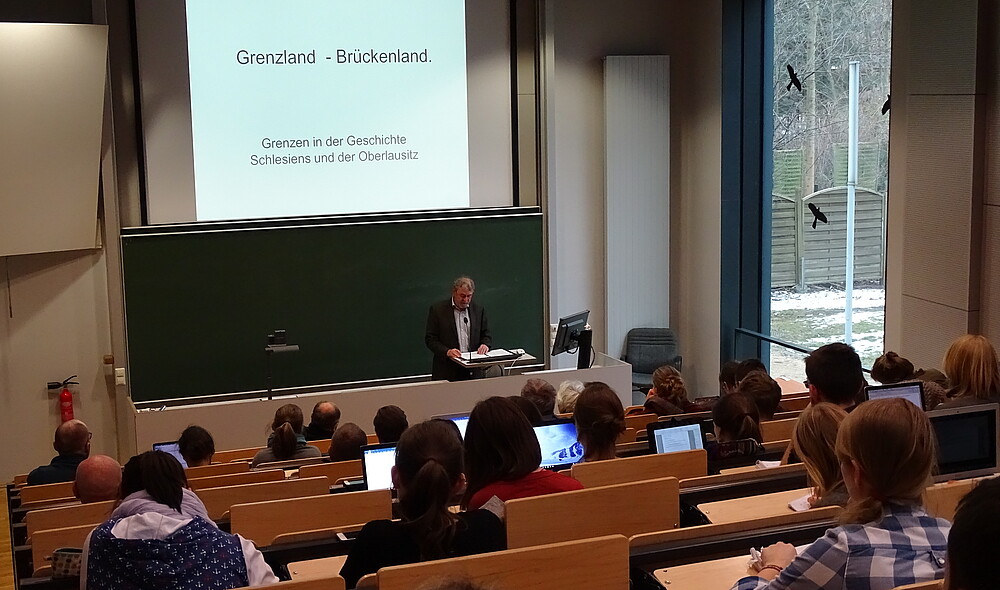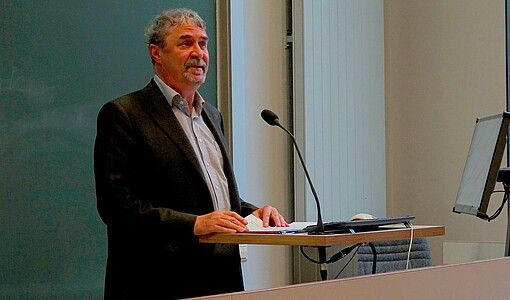The lecture series in the Master's degree course "Management of social change" (in the summer semester also the East-West College) at Zittau/Görlitz University of Applied Sciences is dedicated to the topic of "The East-Central European region: old and new border (crossings)" in the 2018 summer semester. As part of the program, Dr. Markus Bauer (Director of the Silesian Museum Görlitz) opened the lecture series on 22 March 2018 with his lecture on "Borderland - Bridging Land. Borders in the history of Silesia and Upper Lusatia".
In this first of a total of eight lectures in the program series, around 40 participants embarked on a journey through the history of borders and border crossings in Silesia and Upper Lusatia. Dr. Bauer's historical review began 1000 years ago. He provided an insight into the geographical and political changes and the associated consequences for the people living in the regions (Silesia and Upper Lusatia).
At that time, the borders of Upper Lusatia and Silesia were not "sharply" drawn as we know them from today's national borders. The expansion of the land and the settlement processes began in the 12th century. So-called settlement cells, which were created by clearing forest areas and the settlement of people, formed the borders of the time. Territorial and sovereign changes forced some people to leave their territories. The changing power relations caused problems of various kinds for the population.
One particular problem was the different languages. The immigrants brought their language and culture with them. In addition to the Slavic language, there were also German, Polish and Czech-Moravian (the name given to the different Czech dialects). As a result, higher offices were only filled by people who spoke the language of the area.
In addition to resettlement, the consequences of the wars also included the persecution of certain groups of people on the basis of their religion. However, the borders did not prevent people from traveling. Travelers and merchants were referred to as frontiersmen of the time. The borders were important for the collection of customs duties and tax revenue in the respective territory. The trade routes of the time played a key role in the development of European culture. Migration processes were part of the history of Upper Lusatia and Silesia over the centuries.
In his concluding remarks, Dr. Bauer made it clear that the history of Silesia and Upper Lusatia was strongly influenced by interculturality due to this constant change of different borders. The subsequent discussion offered the opportunity to ask the speaker specific questions. Central questions related to the irony of today's handling of interculturality despite the underlying history.
There was also a strong interest in the views of the people who had to leave their homeland at that time. One participant, who was himself expelled from his Silesian homeland due to the shifting of borders, spoke about this. He still describes himself as Silesian today and feels very close to his culture of origin. In the other readings in the program series, the speakers from Germany, the Czech Republic and Poland will examine the borders between East and West from different perspectives. Social, cultural and geographical perspectives will play a role.
The next reading will be given by Dipl.-Paed. Jan Steffens from TU Dresden on April 5, 2018 under the topic "Intersubjectivity, Border and Alterity. Social relations in interaction with culture and society".
Text: Elén Klimmer and Elisabeth Linke
Photos: Cornelia Müller
Contact:
Cornelia Müller
Employee in the Master's program "Management of social change"
Phone: 03581/374-4274
Office: Building GI (Blue Box), Room 1.09
Postal address: Zittau/Görlitz University of Applied Sciences
Brückenstraße 1, 02826 Görlitz


